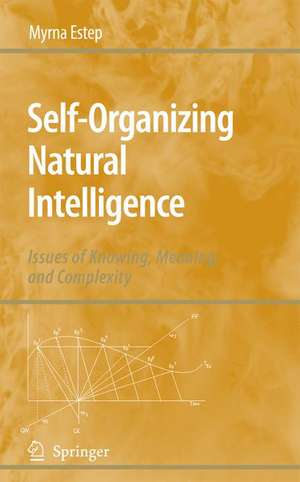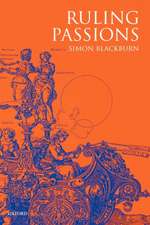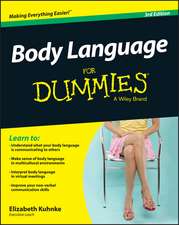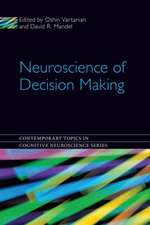Self-Organizing Natural Intelligence: Issues of Knowing, Meaning, and Complexity
Autor Myrna Estepen Limba Engleză Hardback – 18 oct 2006
This book proposes, utilizes, and demonstrates the research superiority of a highly developed multidisciplinary theory models approach to intelligence. With conceptual tools, concepts and mathematical methods more suited to continuous, dynamic phenomena of living things, the entire scope of natural intelligence based upon empirical studies of actual human and animal experience is addressed. Results show that human and animal intelligence is largely self-organizing and emergent across a spectrum of major categories of kinds of natural intelligence, not limited to a single "top down" capacity as current proponents of the single-capacity g-theory and IQ approach support.
Contrary to the single-capacity verbal theory of intelligence, this work argues and shows evidence for three major categories of natural intelligence. Overwhelming empirical evidence is given to show that our understanding of cognition itself must be broadened to include nonverbal immediate awareness as a category of natural intelligence that is embedded within sensory and somatosensory-motor processes that make possible yet another category of intelligence, knowing how.
While most current theories of intelligence assume that the mind is entirely computational, and also assume that sensation is cognitively "neutral," having no intentionality, here empirical evidence is presented from numerous clinical studies showing that certain primitive sensory processes are not cognitively neutral, nor dothey require a representational language interface in order to be accessible to cognitive (intelligence) processes.
This volume describes a rigorous treatment and exhaustive classification of natural intelligence while also demonstrating a more adequate scientific and mathematical approach than current statistical and psychometric approaches shoring up the out-dated and misused IQ hypothetical construct.
ABOUT THE AUTHOR:
Myrna Lynne Estep holds the B.A., M.S., and Ph.D. degrees from Indiana University, Bloomington, where she also taught and where much of the research for this book was originally done. She has also held faculty positions at the University of Zimbabwe; a branch of the University of Texas; and held various professional positions with the U.S. Government. She is the author of numerous scientific and technological papers, two books, co-editor of another, and has conducted studies in social and political theory affecting women, minorities, and the poor. Her biography appears in numerous reference books including The Directory of American Scholars; various editions of the Marquis Who's Who and Who’s Who in Science and Engineering. She was elected a member of the Honor Society of Phi Kappa Phi in 1992, and is an active researcher and writer in the behavioral sciences and artificial intelligence. Along with her husband, philosopher-scientist Richard Schoenig, she spends much of her time in West Texas and in the high San Juan Mountains of southwest Colorado.
| Toate formatele și edițiile | Preț | Express |
|---|---|---|
| Paperback (1) | 645.14 lei 43-57 zile | |
| SPRINGER NETHERLANDS – 13 sep 2014 | 645.14 lei 43-57 zile | |
| Hardback (1) | 650.37 lei 43-57 zile | |
| SPRINGER NETHERLANDS – 18 oct 2006 | 650.37 lei 43-57 zile |
Preț: 650.37 lei
Preț vechi: 765.14 lei
-15% Nou
Puncte Express: 976
Preț estimativ în valută:
124.44€ • 130.28$ • 102.97£
124.44€ • 130.28$ • 102.97£
Carte tipărită la comandă
Livrare economică 07-21 aprilie
Preluare comenzi: 021 569.72.76
Specificații
ISBN-13: 9781402052750
ISBN-10: 1402052758
Pagini: 392
Ilustrații: XXXII, 359 p.
Dimensiuni: 155 x 235 x 25 mm
Greutate: 0.69 kg
Ediția:2006
Editura: SPRINGER NETHERLANDS
Colecția Springer
Locul publicării:Dordrecht, Netherlands
ISBN-10: 1402052758
Pagini: 392
Ilustrații: XXXII, 359 p.
Dimensiuni: 155 x 235 x 25 mm
Greutate: 0.69 kg
Ediția:2006
Editura: SPRINGER NETHERLANDS
Colecția Springer
Locul publicării:Dordrecht, Netherlands
Public țintă
ResearchCuprins
The Problem of Intelligence.- The Universe of Intelligence.- The Genesis of Intelligence: Innate and Emergence Arguments.- The Intelligence of Doing: Sensorimotor Domains and Knowing How.- Universals, Mathematical Thought and Awareness.- Intelligence as Self-Organizing Emerging Complexity.- Mapping Natural Intelligence to Machine Space.- Summary and Conclusions of Self-Organizing Natural Intelligence.
Notă biografică
Myrna Lynne Estep holds the B.A., M.S., and Ph.D. degrees from Indiana University, Bloomington, where she also taught and where much of the research for this book was originally done. She has also held faculty positions at the University of Zimbabwe; a branch of the University of Texas; and held various professional positions with the U.S. Government. She is the author of numerous scientific and technological papers, two books, co-editor of another, and has conducted studies in social and political theory affecting women, minorities, and the poor. Her biography appears in numerous reference books including The Directory of American Scholars; various editions of the Marquis Who's Who and Who’s Who in Science and Engineering. She was elected a member of the Honor Society of Phi Kappa Phi in 1992, and is an active researcher and writer in the behavioral sciences and artificial intelligence. Along with her husband, philosopher-scientist Richard Schoenig, she spends much of her time in West Texas and in the high San Juan Mountains of southwest Colorado.
Textul de pe ultima copertă
Self-Organizing Natural Intelligence brings new scientific methods to intelligence research that is currently under the influence of largely classical 19th century single causal theory and method. This out-dated classical approach has resulted in the single-capacity g-theory, a "central processor," top-down, genetically determined linguistic view of intelligence that is directly contradicted by empirical facts of human and animal studies of intelligence.
This book proposes, utilizes, and demonstrates the research superiority of a highly developed multidisciplinary theory models approach to intelligence. With conceptual tools, concepts and mathematical methods more suited to continuous, dynamic phenomena of living things, the entire scope of natural intelligence based upon empirical studies of actual human and animal experience is addressed. Results show that human and animal intelligence is largely self-organizing and emergent across a spectrum of major categories of kinds of natural intelligence, not limited to a single "top down" capacity as current proponents of the single-capacity g-theory and IQ approach support.
Contrary to the single-capacity verbal theory of intelligence, this work argues and shows evidence for three major categories of natural intelligence. Overwhelming empirical evidence is given to show that our understanding of cognition itself must be broadened to include nonverbal immediate awareness as a category of natural intelligence that is embedded within sensory and somatosensory-motor processes that make possible yet another category of intelligence, knowing how.
While most current theories of intelligence assume that the mind is entirely computational, and also assume that sensation is cognitively "neutral," having no intentionality, here empirical evidence is presented from numerous clinical studies showing that certain primitive sensory processes are not cognitively neutral, nor dothey require a representational language interface in order to be accessible to cognitive (intelligence) processes.
This volume describes a rigorous treatment and exhaustive classification of natural intelligence while also demonstrating a more adequate scientific and mathematical approach than current statistical and psychometric approaches shoring up the out-dated and misused IQ hypothetical construct.
ABOUT THE AUTHOR:
Myrna Lynne Estep holds the B.A., M.S., and Ph.D. degrees from Indiana University, Bloomington, where she also taught and where much of the research for this book was originally done. She has also held faculty positions at the University of Zimbabwe; a branch of the University of Texas; and held various professional positions with the U.S. Government. She is the author of numerous scientific and technological papers, two books, co-editor of another, and has conducted studies in social and political theory affecting women, minorities, and the poor. Her biography appears in numerous reference books including The Directory of American Scholars; various editions of the Marquis Who's Who and Who’s Who in Science and Engineering. She was elected a member of the Honor Society of Phi Kappa Phi in 1992, and is an active researcher and writer in the behavioral sciences and artificial intelligence. Along with her husband, philosopher-scientist Richard Schoenig, she spends much of her time in West Texas and in the high San Juan Mountains of southwest Colorado.
This book proposes, utilizes, and demonstrates the research superiority of a highly developed multidisciplinary theory models approach to intelligence. With conceptual tools, concepts and mathematical methods more suited to continuous, dynamic phenomena of living things, the entire scope of natural intelligence based upon empirical studies of actual human and animal experience is addressed. Results show that human and animal intelligence is largely self-organizing and emergent across a spectrum of major categories of kinds of natural intelligence, not limited to a single "top down" capacity as current proponents of the single-capacity g-theory and IQ approach support.
Contrary to the single-capacity verbal theory of intelligence, this work argues and shows evidence for three major categories of natural intelligence. Overwhelming empirical evidence is given to show that our understanding of cognition itself must be broadened to include nonverbal immediate awareness as a category of natural intelligence that is embedded within sensory and somatosensory-motor processes that make possible yet another category of intelligence, knowing how.
While most current theories of intelligence assume that the mind is entirely computational, and also assume that sensation is cognitively "neutral," having no intentionality, here empirical evidence is presented from numerous clinical studies showing that certain primitive sensory processes are not cognitively neutral, nor dothey require a representational language interface in order to be accessible to cognitive (intelligence) processes.
This volume describes a rigorous treatment and exhaustive classification of natural intelligence while also demonstrating a more adequate scientific and mathematical approach than current statistical and psychometric approaches shoring up the out-dated and misused IQ hypothetical construct.
ABOUT THE AUTHOR:
Myrna Lynne Estep holds the B.A., M.S., and Ph.D. degrees from Indiana University, Bloomington, where she also taught and where much of the research for this book was originally done. She has also held faculty positions at the University of Zimbabwe; a branch of the University of Texas; and held various professional positions with the U.S. Government. She is the author of numerous scientific and technological papers, two books, co-editor of another, and has conducted studies in social and political theory affecting women, minorities, and the poor. Her biography appears in numerous reference books including The Directory of American Scholars; various editions of the Marquis Who's Who and Who’s Who in Science and Engineering. She was elected a member of the Honor Society of Phi Kappa Phi in 1992, and is an active researcher and writer in the behavioral sciences and artificial intelligence. Along with her husband, philosopher-scientist Richard Schoenig, she spends much of her time in West Texas and in the high San Juan Mountains of southwest Colorado.
Caracteristici
Brings new scientific methods to intelligence research Argues and shows evidence for three major categories of natural intelligence Presents empirical evidence from numerous clinical studies Presents a rigorous treatment and exhaustive classification of natural intelligence















